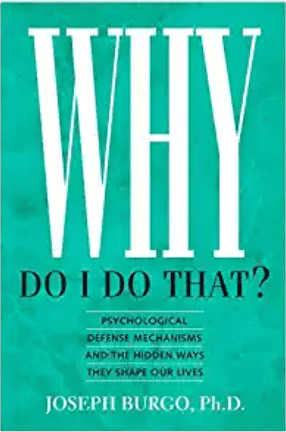Coping Vs Defense Mechanisms: Understanding the Key Differences
Coping mechanisms are conscious strategies that individuals use to manage stress and emotions in a healthy way. Coping mechanisms can include activities such as exercise, meditation, or talking to a friend. Coping mechanisms are typically effective and promote mental and emotional well-being.
Defense mechanisms, on the other hand, are unconscious psychological strategies that individuals use to protect themselves from anxiety or emotional pain. Defense mechanisms can include denial, projection, or repression. While defense mechanisms may provide temporary relief from anxiety, they are generally unhealthy and can interfere with personal relationships and overall well-being.
Positive coping mechanisms
- Exercise
- Mindfulness
- Painting
- Writing
- Playing music
Negative coping mechanisms
-Using drugs
- Alcohol
- Injuring oneself which can include burning or cutting oneself
- Isolation
- Denial
- Repression
- Projection
- Displacement
- Regression
- Sublimation
It's normal to use particular coping mechanisms when we are faced with challenging circumstances. These techniques help us to process the emotions or situations at hand and move forward. We often talk about “defense mechanisms” alongside these coping methods, but what is the difference between them?
This post will compare coping and defense mechanisms and the difference between them.

Coping mechanisms
Coping mechanisms are healthy ways of dealing with stressors or challenges in life. These coping methods aid people in handling difficult situations, controlling their emotions, and preserving their general well-being. Coping styles are a set of relatively stable traits determining an individual's behavior in response to stress, consistent over time and across situations [2].
Both coping strategies (positive and negative) involve the use of various strategies and techniques that help individuals to handle stress. However, having a positive coping strategy is more beneficial to one's mental health.
Developing effective coping skills, however, involves conscious processes like problem-solving, thinking of different perspectives, and adjusting how individuals manage stress. [1]
Types of coping mechanisms
Positive coping mechanisms
- Exercise
- Mindfulness
- Painting
- Writing
- Playing music
- Spending time with loved ones
- Participating in group activities
- Time management
- Getting enough sleep
- Eating well
- Practicing good hygiene
Negative coping mechanisms
- Using drugs
- Alcohol
- Injuring oneself which can include burning or cutting oneself
- Isolation
- Avoiding public speaking or meeting new people
- Acting aggressively towards others, either verbally or physically
- Denying or minimizing the existence of problems[2]
The Importance of Healthy Coping Mechanisms
Healthy coping mechanisms play a vital role in managing stress, overcoming challenges, and maintaining overall well-being and mental health. In this section, we will discuss the benefits of utilizing healthy coping mechanisms and their impact on your well-being.
Advantages of Healthy Coping Mechanisms
- Emotional regulation: Healthy coping mechanisms enable you to better manage and process your emotions, preventing them from becoming overwhelming or unmanageable
- Stress reduction: Effective coping strategies can help reduce the negative effects of stress on your mental and physical health
- Improved problem-solving skills: Practicing healthy coping mechanisms can enhance your ability to address and resolve issues in a more constructive and efficient manner
- Enhanced resilience: Developing effective coping skills can increase your ability to bounce back from setbacks and adversity, fostering emotional resilience
- Better relationships: Healthy coping mechanisms can lead to improved communication, understanding, and emotional connection with others
How Healthy Coping Mechanisms Impact Well-Being and Mental Health
The consistent practice of healthy coping mechanisms can have a significant positive impact on overall well-being and mental health. Some of the benefits include:
- Reduced symptoms of anxiety and depression: Healthy coping strategies can help alleviate symptoms of anxiety and depression by promoting emotional regulation and providing a sense of control
- Improved self-esteem: Developing effective coping skills can increase feelings of self-worth, competence, and confidence in one's ability to handle life's challenges
- Greater life satisfaction: Utilizing healthy coping mechanisms can contribute to a more positive outlook on life and overall satisfaction with one's circumstances
- Enhanced cognitive function: Managing stress effectively through healthy coping mechanisms can help improve focus, concentration, and decision-making abilities
Cultivating Healthy Coping Mechanisms
Developing healthy coping skills is crucial for managing stress and maintaining mental and emotional well-being. In this section, we will explore various tips and strategies for cultivating healthy coping skills, such as mindfulness techniques, stress management, and self-reflection.
Mindfulness Techniques
Mindfulness involves being present in the moment and cultivating a non-judgmental awareness of one's thoughts, feelings, and experiences. Practicing mindfulness can help reduce stress and improve emotional regulation. Some mindfulness techniques include:
- Meditation: Set aside time each day to practice meditation, focusing on your breath and allowing thoughts to come and go without judgment.
- Body scan: Perform a mental scan of your body, starting from your head and moving down to your toes, acknowledging any sensations or tension you may experience.
- Mindful eating: Pay attention to the taste, texture, and aroma of your food as you eat, savoring each bite and appreciating the nourishment it provides.
Stress Management
Managing stress is an essential aspect of cultivating healthy coping skills. Consider these stress management strategies:
- Physical activity: Engage in regular physical exercise, such as walking, running, or yoga, to help reduce stress and boost mood.
- Time management: Prioritize tasks and create a daily schedule to manage your time effectively and reduce stress from feeling overwhelmed.
- Social support: Build a strong support network of friends, family, or support groups to share your thoughts and feelings, and provide encouragement during challenging times.
Self-Reflection
Self-reflection involves examining your thoughts, emotions, and actions to gain insight into your behaviors and promote personal growth. Tips for practicing self-reflection include:
- Journaling: Keep a daily journal to record your thoughts, feelings, and experiences, helping you identify patterns and areas for growth.
- Self-compassion: Treat yourself with kindness and understanding, acknowledging that everyone faces challenges and makes mistakes.
- Set goals: Establish personal goals for self-improvement and monitor your progress regularly, celebrating your achievements along the way.
Additional Coping Strategies
Consider incorporating these additional coping strategies to further enhance your emotional well-being:
- Creative outlets: Engage in creative activities, such as painting, writing, or playing a musical instrument, to express emotions and relieve stress.
- Deep breathing exercises: Practice deep, slow breaths to calm your mind and reduce stress in tense situations.
- Sleep hygiene: Prioritize sleep by maintaining a consistent sleep schedule, creating a relaxing bedtime routine, and ensuring a comfortable sleep environment. [9]
Defense mechanisms
A defense mechanism is an unconscious psychological strategy that people use to protect themselves from uncomfortable emotions such as anxiety, guilt, mental illness, or shame. These strategies are automatic and are typically used without awareness.
Defense mechanisms can be either maladaptive or adaptive depending on context and severity. They can be categorized into primitive and higher-level defense mechanisms. Primitive defense mechanisms include acting out, avoidance, conversion, denial, identification, projection, regression, repression, schizoid fantasy, and splitting, while higher-level defense mechanisms include anticipation, compensation, displacement, humor, intellectualization, isolation of affect, rationalization, reaction formation, sexualization, sublimation, and suppression.
Defensive mechanisms can be beneficial in the short term by assisting people in coping with stressful events. But over time, they can turn into maladaptive coping mechanisms that have unintended negative consequences. Early identification of defense mechanisms in adolescence can help predict further development of personality disorders. Enhancing healthcare team outcomes can be achieved by recognizing and communicating about defense mechanisms among psychiatrists, psychologists, social workers, primary care providers, nurses, and families. [7] [3]
Defense mechanisms
A defense mechanism is an unconscious psychological strategy that people use to protect themselves from uncomfortable emotions such as anxiety, guilt, mental illness, or shame. These strategies are automatic and are typically used without awareness.
Defense mechanisms are often used as avoidant coping strategies correlated with maladaptive behaviors, such as denial and repression, to protect oneself from unpleasant thoughts or emotions.
Defensive mechanisms can be beneficial in the short term by assisting people in coping with stressful events. But over time, they can turn into maladaptive coping mechanisms that have unintended negative consequences. [3]
Types of defense mechanisms
- Denial
- Repression
- Projection
- Displacement
- Regression
- Sublimation
- Rationalization
- Reaction formation
- Introjection
- Identification with the aggressor [4]
Impact on Relationships
Defense mechanisms can have both positive and negative effects on relationships. While they can sometimes provide short-term relief from emotional pain, they can also lead to misunderstandings, miscommunication, and emotional distance between partners or friends. For example:
- Denial can prevent a person from addressing issues in a relationship, leading to unresolved conflicts and emotional disconnection
- Projection can cause a person to unfairly blame their partner for their own feelings or problems, leading to resentment and tension
- Rationalization can make it difficult for a person to take responsibility for their actions, preventing growth and accountability within the relationship
- Displacement can lead to misplaced anger or frustration, causing unnecessary conflict and strain on the relationship
Impact on Personal Growth
The use of defense mechanisms can hinder personal growth and self-awareness by preventing individuals from confronting their true feelings and emotions. This can result in a lack of self-understanding and difficulty managing emotions effectively. Some potential consequences include:
- Stunted emotional development: By avoiding or repressing uncomfortable emotions, a person may not develop the emotional maturity and resilience needed to cope with life's challenges
- Reduced self-awareness: Using defense mechanisms can prevent a person from gaining a deeper understanding of their own thoughts, feelings, and motivations
- Limited coping skills: Relying on defense mechanisms can prevent a person from developing healthy coping strategies, making it harder to deal with stress, anxiety, or other negative emotions [7]
Overcoming Defense Mechanisms
In order to foster healthier relationships and personal growth, it is essential to recognize and address the defense mechanisms that may be holding you back. Some steps to consider include:
- Practicing self-reflection: Regularly reflect on your thoughts, feelings, and actions to increase self-awareness and identify any defense mechanisms you may be using
- Seeking professional help: A therapist or counselor can help you understand and work through your defense mechanisms, providing guidance and support for personal growth
- Developing healthy coping strategies: Replace defense mechanisms with healthier ways of managing stress and negative emotions, such as mindfulness, deep breathing, or talking to a trusted friend or family member
The Neuroscience Behind Defense Mechanisms
Understanding the brain processes behind defense mechanisms is crucial to grasp the complexity of human psychology. In this section, we'll delve into the neuroscientific aspects of defense mechanisms, including the brain regions and neural pathways involved in their activation and execution.
The Role of the Limbic System and Amygdala
The limbic system, a complex network of brain structures responsible for emotions and memory, plays a crucial role in defense mechanisms. A key component of the limbic system, the amygdala, is responsible for processing emotional reactions such as fear, anxiety, and aggression. When confronted with a perceived threat, the amygdala activates, triggering various emotional and behavioral responses aimed at protecting the individual from harm.
The Prefrontal Cortex and Defense Mechanisms
The prefrontal cortex (PFC), located in the front part of the brain, is responsible for higher cognitive functions such as decision-making, planning, and self-control. The PFC plays a significant role in regulating emotions and managing defense mechanisms. When faced with a stressful situation, the PFC works in conjunction with the amygdala to assess the threat and determine an appropriate response.
Neural Pathways and the Stress Response
The activation of defense mechanisms is closely linked to the stress response. When the brain perceives a threat, it triggers the release of stress hormones such as cortisol and adrenaline, preparing the body for a fight-or-flight response. The hypothalamic-pituitary-adrenal (HPA) axis, a complex network of neural and hormonal interactions, regulates this stress response. The HPA axis's activation can lead to the utilization of defense mechanisms, aiming to protect the individual from overwhelming emotions or psychological distress.
Neuroplasticity and the Development of Defense Mechanisms
Neuroplasticity, the brain's ability to reorganize and adapt itself, plays a significant role in the development and maintenance of defense mechanisms. As individuals repeatedly engage in specific behaviors or thought patterns in response to stress, neural pathways strengthen, reinforcing the use of these defense mechanisms. This process can make it challenging to break free from maladaptive coping strategies and adopt healthier alternatives.[10]
The Link Between Defense Mechanisms and Mental Health Disorders
Defense mechanisms can play a significant role in the development and exacerbation of mental health disorders such as anxiety, depression, and personality disorders. In this section, we will explore how the use of defense mechanisms can contribute to the onset or worsening of various psychological conditions.
Defense Mechanisms and Anxiety Disorders
Anxiety disorders are characterized by excessive worry, fear, and a constant sense of impending danger. The use of defense mechanisms, especially those that involve avoidance, can contribute to the development or exacerbation of anxiety disorders. For instance:
- Avoidance: By consistently avoiding situations that provoke anxiety, individuals can inadvertently reinforce their fears and perpetuate a cycle of anxiety and avoidance.
- Denial: Denying the existence of anxiety or its triggers can prevent individuals from confronting their fears and addressing the root causes of their anxiety.
Defense Mechanisms and Depression
Depression is a mental health disorder characterized by persistent feelings of sadness, hopelessness, and a lack of interest in daily activities. Defense mechanisms can contribute to the development or worsening of depression in various ways:
- Repression: Suppressing painful emotions and memories can lead to a buildup of unresolved emotions, contributing to the onset or worsening of depressive symptoms.
- Isolation: Social withdrawal as a defense mechanism can exacerbate feelings of loneliness and disconnection, increasing the risk of depression.
Defense Mechanisms and Personality Disorders
Personality disorders are characterized by enduring patterns of inflexible and maladaptive behaviors, emotions, and thought patterns. Defense mechanisms can play a significant role in the development and maintenance of personality disorders, as they often serve as a means for individuals to cope with their inner turmoil. For example:
- Projection: Individuals with borderline personality disorder may engage in projection as a way to externalize their intense emotions and fears of abandonment, leading to unstable relationships and a distorted self-image.
- Reaction formation: Those with obsessive-compulsive personality disorder may use reaction formation as a defense mechanism to cope with their deep-seated feelings of inadequacy, leading to rigid perfectionism and a preoccupation with rules and order. [11]
Differences Between Coping and Defense Mechanisms
When dealing with stress, anxiety, or depressive symptoms, people use coping mechanisms and defense mechanisms to respond. Coping mechanisms can either be positive or negative, with positive ones being more beneficial for mental health and stress management.
On the other hand, defense mechanisms are unconscious psychological strategies that people use to protect themselves from unpleasant emotions such as anxiety, guilt, or shame. These mechanisms can manifest as behaviors or attitudes that help individuals avoid dealing with their emotions. While defense mechanisms may be advantageous in the short run, excessive use can have detrimental long-term effects.
Similarly, adults with depression also use coping strategies to manage their symptoms. According to a 2020 survey by the National Alliance on Mental Illness, the top five coping strategies used by adults with depression are praying, seeking professional help, and spending time with pets. By recognizing and utilizing positive coping strategies, individuals can effectively manage their mental health and improve their overall well-being. [5]
Key differences
Purpose
Coping mechanisms are conscious strategies that people use to manage stress and difficult situations, whereas defense mechanisms are unconscious psychological strategies used to protect the ego from anxiety and emotional pain.
Awareness
Coping mechanisms involve being aware of the stressor and making a deliberate effort to manage it, while defense mechanisms are often automatic and outside conscious awareness.
Effectiveness
Defense mechanisms are frequently seen as maladaptive and can have detrimental long-term effects, whereas coping mechanisms are typically regarded as healthy and effective ways of managing stress.
Adaptability
Coping mechanisms can be adapted and changed based on the situation, while defense mechanisms tend to be rigid and inflexible.
Outcome
Defense mechanisms work to shield the person from emotional pain and anxiety, even if it means denying reality or avoiding responsibilities. Coping mechanisms work to relieve stress and promote general well-being. [6]
How online therapy can help you adopt positive coping skills?
Online therapy can be very effective in helping individuals to make a psychological adjustment by adopting positive coping skills. A therapist may assist a person to discover their current coping mechanisms and help them come up with new coping strategies by focusing on improving their mental health.
During therapy, a person can learn about the external or internal factors of their negative coping mechanisms and work to address those root causes. In fact, we would recommend checking out Online Therapy.com.
A person can practice and hone their new coping mechanisms in a supportive, nonjudgmental environment that therapy can offer. As a person attempts to adapt and apply these new techniques, a therapist can provide direction, criticism, and encouragement. [7]
The Benefits of Online Therapy for Coping and Defense Mechanisms
Online therapy has become an increasingly popular option for individuals seeking mental health support. With its unique advantages, such as convenience, accessibility, and affordability, it offers an excellent alternative to traditional in-person therapy. In this section, we will discuss the specific benefits of online therapy for individuals dealing with coping and defense mechanisms.
Convenience and Flexibility
One of the most significant advantages of online therapy is the convenience it offers. With the ability to access therapy sessions from the comfort of one's home or any other private space, individuals can more easily fit therapy into their busy schedules. This convenience can be particularly helpful for those struggling with defense mechanisms, as it eliminates common barriers to seeking help, such as transportation, time constraints, and scheduling conflicts.
Accessibility for All
Online therapy can be a game-changer for individuals living in rural or remote areas, where access to mental health services may be limited. By providing a platform for virtual therapy sessions, individuals can access the support they need to work on their coping and defense mechanisms, regardless of their geographic location.
Affordability
Online therapy can be more affordable than traditional in-person therapy, as therapists may charge lower fees for virtual sessions, and clients can save on transportation costs. This increased affordability can make therapy more accessible for those struggling with defense mechanisms and seeking support to develop healthier coping strategies.
Anonymity and Privacy
For individuals dealing with defense mechanisms, the anonymity and privacy offered by online therapy can be a significant advantage. The virtual nature of online therapy allows clients to maintain their privacy and confidentiality, which may encourage more open and honest communication during therapy sessions.
Specific Support for Coping and Defense Mechanisms
Online therapy platforms often provide a wide range of therapists with varying specialties, enabling clients to find a professional who has experience in addressing coping and defense mechanisms. This targeted support can be crucial in helping individuals develop healthier coping strategies and work through their defense mechanisms.
Differences Between Coping and Defense Mechanisms
Coping mechanisms and defense mechanisms are two different ways people respond to stressful situations, anxiety, or even depressive symptoms. Coping mechanisms can be positive or negative. But a positive coping mechanism is better for a person's mental health and stress management.
In contrast, defense mechanisms are unconscious psychological strategies people use to protect themselves. These types of strategies are used to form defense mechanisms from unpleasant emotions, such as anxiety, guilt, or shame.
Defense mechanisms are often automatic and can manifest as behaviors or attitudes that help people avoid dealing with their feelings. Defense mechanisms can be advantageous in the short run, but if they are used excessively, they can have detrimental long-term effects. [5]
Key differences
Purpose
Coping mechanisms are conscious strategies that people use to manage stress and difficult situations, whereas defense mechanisms are unconscious psychological strategies used to protect the ego from anxiety and emotional pain.
Awareness
Coping mechanisms involve being aware of the stressor and making a deliberate effort to manage it, while defense mechanisms are often automatic and outside conscious awareness.
Effectiveness
Defense mechanisms are frequently seen as maladaptive and can have detrimental long-term effects, whereas coping mechanisms are typically regarded as healthy and effective ways of managing stress.
Adaptability
Coping mechanisms can be adapted and changed based on the situation, while defense mechanisms tend to be rigid and inflexible.
Outcome
Defense mechanisms work to shield the person from emotional pain and anxiety, even if it means denying reality or avoiding responsibilities. Coping mechanisms work to relieve stress and promote general well-being. [6]
How online therapy can help you adopt positive coping skills?
Online therapy can be very effective in helping individuals to make a psychological adjustment by adopting positive coping skills. A therapist may assist a person to discover their current coping mechanisms and help them come up with new coping strategies by focusing on improving their mental health.
During therapy, a person can learn about the external or internal factors of their negative coping mechanisms and work to address those root causes. In fact, we would recommend checking out Online Therapy.com.
A person can practice and hone their new coping mechanisms in a supportive, nonjudgmental environment that therapy can offer. As a person attempts to adapt and apply these new techniques, a therapist can provide direction, criticism, and encouragement. [7]
The Benefits of Online Therapy for Coping and Defense Mechanisms
Online therapy has become an increasingly popular option for individuals seeking mental health support. With its unique advantages, such as convenience, accessibility, and affordability, it offers an excellent alternative to traditional in-person therapy. In this section, we will discuss the specific benefits of online therapy for individuals dealing with coping and defense mechanisms.
Convenience and Flexibility
One of the most significant advantages of online therapy is the convenience it offers. With the ability to access therapy sessions from the comfort of one's home or any other private space, individuals can more easily fit therapy into their busy schedules. This convenience can be particularly helpful for those struggling with defense mechanisms, as it eliminates common barriers to seeking help, such as transportation, time constraints, and scheduling conflicts.
Accessibility for All
Online therapy can be a game-changer for individuals living in rural or remote areas, where access to mental health services may be limited. By providing a platform for virtual therapy sessions, individuals can access the support they need to work on their coping and defense mechanisms, regardless of their geographic location.
Affordability
Online therapy can be more affordable than traditional in-person therapy, as therapists may charge lower fees for virtual sessions, and clients can save on transportation costs. This increased affordability can make therapy more accessible for those struggling with defense mechanisms and seeking support to develop healthier coping strategies.
Anonymity and Privacy
For individuals dealing with defense mechanisms, the anonymity and privacy offered by online therapy can be a significant advantage. The virtual nature of online therapy allows clients to maintain their privacy and confidentiality, which may encourage more open and honest communication during therapy sessions.
Specific Support for Coping and Defense Mechanisms
Online therapy platforms often provide a wide range of therapists with varying specialties, enabling clients to find a professional who has experience in addressing coping and defense mechanisms. This targeted support can be crucial in helping individuals develop healthier coping strategies and work through their defense mechanisms.
Conclusion
Having the right balance between using healthy coping and defense strategies can ultimately help you manage your stress levels and lead a healthier life! Having said that, it's critical to recognize when further assistance from experts is needed so that you can tackle any issues head-on.
FAQ
What distinguishes good coping techniques from unhealthy ones?
While unhealthy coping strategies involve abusing substances or engaging in other damaging behaviors as a way to cope with challenging emotions or circumstances, good coping strategies can be utilized to effectively manage and lower stress levels.
ow can I tell if I need professional help?
Speaking with a therapist or doctor can help you understand why your coping mechanisms are ineffective and provide you the opportunity to create more effective ways of handling difficult feelings or circumstances.
References
- ScienceDirect: Coping Strategies
- Study.com: Coping Strategy Types & Examples
- Simplypsychology.org: Defense Mechanisms In Psychology Explained (+ Examples)
- Dr.Sharon Galor: Defense mechanisms VS Coping
- Core: Coping and defence mechanisms
- Thriveworks: Healthy coping mechanisms and strategies
- National Library of Medicine: Defense Mechanisms
- National Library of Medicine: Coping Mechanisms
- Winneba Campus of University of Education: Coping With Stress: Strategies Adopted by Students
- Research Gate: How Does Our Brain Constitute Defense Mechanisms? First-Person Neuroscience and Psychoanalysis
- University of Saskatchewan, Saskatoon: A Thesis Submitted to the College of Graduate Studies and Research











